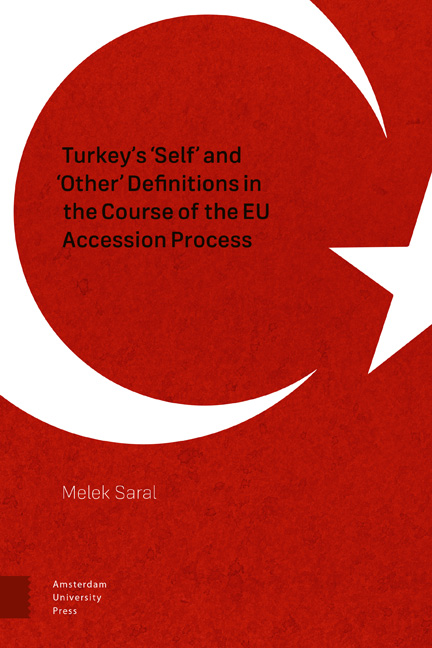Book contents
- Frontmatter
- Contents
- Acknowledgements
- Abbreviations
- 1 Socialization or Estrangement within the Framework of Turkey-EU Relations
- 2 The Concept of Socialization and Identity Change
- 3 New Phase in Turkey-EU Relations: Opening the Door to Europeanness
- 4 The Helsinki Summit: The Recognition of (Muslim) Turkey’s Europeanness
- 5 Start of Negotiations, End of Negotiations
- 6 New Area, New Identity, New Roles: Turkey – European or Middle Eastern?
- 7 Results and Implications
- Bibliography
- Index
3 - New Phase in Turkey-EU Relations: Opening the Door to Europeanness
Published online by Cambridge University Press: 12 February 2021
- Frontmatter
- Contents
- Acknowledgements
- Abbreviations
- 1 Socialization or Estrangement within the Framework of Turkey-EU Relations
- 2 The Concept of Socialization and Identity Change
- 3 New Phase in Turkey-EU Relations: Opening the Door to Europeanness
- 4 The Helsinki Summit: The Recognition of (Muslim) Turkey’s Europeanness
- 5 Start of Negotiations, End of Negotiations
- 6 New Area, New Identity, New Roles: Turkey – European or Middle Eastern?
- 7 Results and Implications
- Bibliography
- Index
Summary
From 1995 until 2000, Turkey was a highly state-centric, security-oriented, and crisis-ridden country, tackling a number of serious economic, political, and cultural problems, such as a lack of democracy, human rights violations, absence of the rule of law, economic instability, legitimacy crises, and a lack of foreign policy vision and orientation. The relatively high degree of instability in Turkish party politics was reflected in the Turkish political party system of the mid-1990s, which was fragmented and polarized. One of the main reasons for this fragmentation was the division within the center-right and center-left parties. The ANAP and DYP on the center-right and the DSP and CHP on the center-left had great similarities in their ideologies and programs, but no cooperation. The competition within the center-right and center-left caused splintering of the votes. Moreover, the centrist parties failed in dealing with the economic and social problems, resulting in a dramatic decline in their electoral support (Sayarı 2002: 18- 19). The inconclusive elections and weak coalitions drew the country into political instability. None of the parliamentary elections held in 1991, 1995, and 1999 resulted in a majority party government, despite the use of a 10% national threshold for representation in parliament. From October 1995 until November 2002, Turkey had seven different governments, mainly two- or three-party coalition governments, including DYP-CHP, ANAP-DYP, RP-DYP, the minority cabinet of ANAP-DSP-DTP (Demokratik Toplum Partisi [Democratic Society Party]) along with independent deputies, and SP-MHP-ANAP (TBMM 2014a). The 1995 parliamentary elections failed to produce a stable government and power oscillated between several unmanageable coalitions, including the Welfare Party (Refah Partisi [RP]), an Islamist party which was ultimately overthrown by a ‘postmodern coup’ in February 1997. After the Welfare Party coalition was overthrown, the parliament failed to produce stable governments, resulting in the alternation of unstable minority coalitions until the 1999 elections. The 1999 elections saw the rise of a three-party coalition, led by Ecevit in alliance with the ANAP and the MHP. This coalition was more conservative (MHP-DSP (a weak liberal party)-ANAP), which complicated relations with the EU (Narbone and Tocci 2009: 27). At the same time, despite the 10% threshold, five parties obtained seats in parliament in all three elections. In addition, new parties were usually formed in parliament through factional and party splits, increasing the number of parties represented (there were up to eleven at some points).
- Type
- Chapter
- Information
- Publisher: Amsterdam University PressPrint publication year: 2017



